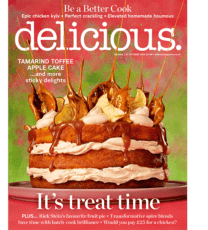Quick Q&A with Ian Marber, Food Doctor
Throw away the low-cal recipes and rigid diet plans, Ian Marber’s new book How Not to Get Fat is like Alan Carr’s Allen Carr’s Easy Way to Stop Smoking for dieters: changing your ways is the only way to change your weight…
In this revolutionary but commonsense book, Ian tells the reader how (not what) to eat so that they will never get fat. Has Ian Marber finally delivered us from dieting?
Your new book explains how food interacts with our bodies and that by understanding this we can break unhealthy eating habits. Is this how you would describe it?
It is, yes. Experience has shown me that rather than trying to out-fox the body, understanding more about how the body functions and eating in a way that works with this leads to a more balanced way of eating. The eating habits that are ‘unhealthy’ are most often borne out of hunger and cravings. Rather than trying to manage this hunger through willpower, eating my way naturally reduces the cravings.
It’s not a diet book, as such, it’s more like the definitive healthy eating plan, sort of like Allen Carr’s Easy Way to Stop Smoking, but for dieters?
Yes, I like that a lot. Dieting now leads to problems in the future and we really need to understand that. In the same way that each cigarette means that you have to have another one quite soon, the negative cycle of losing weight and then gaining it back again is continually perpetuated. To stay well clear of the ‘diet book’ trap I have avoided any meal plans or a list of ‘do’s and don’ts’. This is a tried and tested method, and the several thousand clients I have worked with face to face, on the television, and through columns can attest to its success.
Do you think that people’s relationship with food is purely psychological?
Not at all, but I do believe that our cravings are largely physiological which can have an impact psychologically. Therefore by eating in a way that manages cravings we can liberate ourselves from many of the psychological effects.
What does the book offer people that other diet books don’t?
A long-term solution rather than a diet, plain and simple. The message is clear – dieting leads to feast and famine, sin and reward, which has to be a miserable way to live your life. It encourages the body to lay down glucose as fat to compensate for potential famine, and in the longer term this leads to weight gain, which means you have to diet again! My book liberates us from this negative cycle of dieting by showing the reader how to eat, not how to diet.
You’re a well-respected nutritional therapist: is your view of food a holistic one – i.e. that it’s not just about gaining or losing weight but the effects food has on our mental as well as physical health?
It is, yes. I have always been uncomfortable with the concept that food is only something that makes one fat or thin. Dieting focuses on weight and weight alone, and temporarily ignores our basic nutritional needs on the premise that losing weight is more important. If you can liberate yourself from weight issues and dieting then you can eat with health in mind.
What Top 5 tips can you give to our readers to start them thinking more positively about food and how to counteract cravings?
1. Understand how the body works, and get educated on the basics of how fat is laid down.
2. Don’t fall for short-term fixes or fads, they won’t work for long and can cause you problems further down the line.
3. You can’t eat more now on the promise that you will diet tomorrow, the body doesn’t know that you plan to be good! Be consistent instead, that’s the route to getting rid of cravings.
4. Eat breakfast at home before you leave in the morning, even if it’s something small, rather than rush out of the door on an empty stomach and battle hunger later.
5. Eat every 2½ -3 hours even if you aren’t especially hungry. Rather than eating in a way that results in cravings and requires will power to resist, eating my way manages hunger in the future.
Ian Marber’s How Not to Get Fat, £9.99, Quadrille, is published 1st January, 2010.
Buy this book from Waterstone’s.
Subscribe to our magazine
Food stories, skills and tested recipes, straight to your door... Enjoy 5 issues for just £5 with our special introductory offer.
Subscribe
Unleash your inner chef
Looking for inspiration? Receive the latest recipes with our newsletter